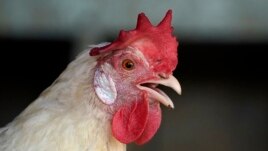27 October 2021
Voters in the American state of Maine decide next week if all its people should be permitted to grow food crops and raise farm animals, or livestock. Supporters of the "right to food" constitutional amendment say it will put people in control of how and what they eat. Opponents argue it will endanger the state's animals and food supplies, and turn city neighborhoods into cow fields.
The vote is set for November 2.
Most food produced in the U.S. comes from commercial farms. Private citizens who want to grow their own food usually live in rural areas. Laws like the one being considered in Maine permit people to grow their own food – including cows and chickens – on their property.
Ron Faulkingham is a Maine state lawmaker and a fisherman. He says big businesses control too much of the food supply in the U.S.
"We want to protect people's ability to grow gardens, grow and raise their own food," he said.

A chicken stands watch in a coop at the Quill's End Farm, Friday, Sept. 17, 2021, in Penobscot, Maine. A ballot question in will give Maine voters a chance to decide on a first-in-the-nation "right to food amendment." AP Photo/Robert F. Bukaty)
People who do not think the law is a good idea say the food supply needs safety rules. Julie Anne Smith leads the Maine Farm Bureau, the state's largest special interest group representing the agriculture industry. She argues that the proposed law is, in her words, "so broad and dangerous" it could make the food supply less safe.
That is a problem in a state where potatoes, blueberries, maple syrup and dairy products are all important parts of the economy, she said. The amendment could empower people in the state to buy and eat food that has not been inspected for safety, Smith suggested.
Most Maine towns and cities have rules, called ordinances, that restrict agricultural operations. Smith said she thinks the proposed amendment, if passed, could weaken local ordinances.
But Rep. Faulkingham says local rules would continue to be enforced under the amendment.
The push for people to grow their own food with limited restrictions is called the food sovereignty movement. Supporters include some owners of small farms and people who seek unprocessed food products, like raw milk. Activists for limited government, and those opposed to powerful corporate control of the food supply are also in favor of the amendment.
Right now, Maine does have a law that permits people who own small farms to sell their products directly to people who visit.
There are similar laws in place in Wyoming, Colorado, Montana and North Dakota. People in other states are working for food freedom laws, too.
Critics of the constitutional amendment in Maine say it needs to be narrowed. They argue that passage of the bill, as written, could permit people to raise livestock anywhere in the state. They suggest a future in which cows freely walk the streets of Maine's cities and towns.
But, Heather Retberg says that idea does not demonstrate a true understanding of the proposed amendment. The Maine farmer raises chickens, goats and other livestock on her 40-hectare property in Penobscot.
She argued that the proposal's main purpose is to move control of the food supply from corporations to small communities and individuals. "It gives us more voice in how we want our food systems to be, and how we want our communities to look."
I'm Dan Friedell.
Dan Friedell adapted this story for Learning English based on a report by The Associated Press. Caty Weaver was the editor.
What kind of food do you grow where you live? Tell us in the Comments Section and visit 51VOA.COM.
_____________________________________________________________________
Words in This Story
commercial – adj. related to or used in the buying and selling of goods and services
sovereignity – n. independent authority and the right to govern itself, in this case, related to food choices
voice – n. a right or way to express your wishes, opinions, etc.